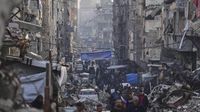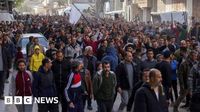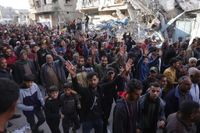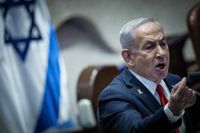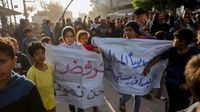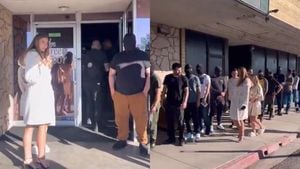Large crowds demonstrated against Hamas on Tuesday, March 25, 2025, marking the first major protest in Gaza against the Palestinian militant group since the war with Israel began more than a year ago. Eyewitnesses reported that the protest, which started as an anti-war demonstration in Beit Lahia, quickly evolved into a significant anti-Hamas rally, with hundreds swelling into thousands as the day progressed.
Participants chanted slogans such as "Out, out, out! Hamas out!" and carried signs that read "Stop the war," "We refuse to die," and "The blood of our children is not cheap." Videos shared on social media by activists depicted the fervor of the demonstrators, who expressed their frustration not just with the ongoing conflict but also with Hamas's governance.
On Wednesday, March 26, 2025, calls for further protests echoed across Gaza, indicating a growing tide of dissent against the ruling group. One protester from Beit Lahia, Mohammed Diab, who lost his home in the war and a brother in an Israeli airstrike a year ago, stated, "We refuse to die for anyone, for any party's agenda or the interests of foreign states. Hamas must step down and listen to the voice of the grieving, the voice that rises from beneath the rubble - it is the most truthful voice." This sentiment resonated with many who took to the streets.
The protests come at a critical juncture in the ongoing conflict, which has escalated dramatically since Israel ended its ceasefire with Hamas a week prior, launching strikes that have reportedly killed hundreds. The Israeli military resumed operations on March 18, 2025, following the collapse of a ceasefire brokered by the U.S., Egypt, and Qatar, which had briefly paused hostilities that began with Hamas's attack on Israel on October 7, 2023.
Israeli Prime Minister Benjamin Netanyahu remarked on the protests during a parliamentary session, stating, "In recent days, we have seen something we have never seen before—public protests against Hamas rule in Gaza. This shows that our policy is working." He emphasized that the Israeli military's objectives include the destruction of Hamas and the return of the 59 remaining hostages held by the group.
Netanyahu's comments came as the Israeli Defense Forces (IDF) intensified their campaign against Hamas, which has been the sole ruler in Gaza since 2007 after winning elections the previous year and violently ousting rivals. The IDF's renewed military campaign is officially named "Operation Strength and Sword," and it aims to dismantle Hamas's military capabilities.
Hamas, for its part, condemned the protests, with its military wing, the Al-Qassam Brigades, labeling demonstrators as "agents" supporting Israel. They suggested that the protests were politically motivated and hinted that the Palestinian Authority in Ramallah might be behind them. Despite this, there were no reported interventions by Hamas security forces during the protests, a notable departure from their typical response to dissent.
The protests highlight a deepening humanitarian crisis in Gaza, where an estimated 70% of buildings have been damaged or destroyed and basic supplies are in critically short supply. The United Nations has reduced aid operations in the territory, citing the devastation caused by Israeli strikes and the blockade of humanitarian aid. Many residents are displaced, and the toll of the conflict has left over 50,000 Palestinians dead, nearly half of whom are women and children, according to Gaza health officials.
As the protests unfolded, they reflected a growing discontent among Gaza's population, many of whom feel abandoned by both Hamas and the international community. One participant expressed, "People are angry at the whole world," including the United States, Israel, and Hamas. The sentiment was echoed by others who have faced repeated displacements and hardships due to the ongoing violence.
In the aftermath of the protests, the political landscape in Gaza may be shifting. Analysts suggest that the rising dissent against Hamas could weaken its grip on power, potentially leading to significant changes in the region's governance. The protests may also signal a turning point in how Gazans view their leadership and their future.
As calls for more protests continue, the international community watches closely. The implications of these demonstrations extend beyond Gaza, potentially affecting regional stability and the ongoing Israeli-Palestinian conflict. The protests represent a rare moment of public dissent in a territory where such expressions have often been met with severe repercussions.
In conclusion, the protests in Gaza signify a critical moment in the ongoing conflict, revealing deep-seated frustrations with Hamas and a yearning for change among the Palestinian populace. The outcome of this unrest remains uncertain, but it could reshape the political landscape in Gaza and influence the broader dynamics of the Israeli-Palestinian conflict.
